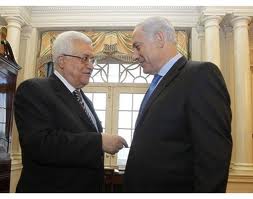By Calev Ben-David
Israeli Prime Minister Benjamin Netanyahu and Palestinian Authority Minister Mahmoud Abbas emerged from their showdown at the United Nations buttressed domestically though no closer to peace talks.
“Abbas succeeded in strengthening his standing among Palestinians and of his ideology of achieving statehood diplomatically against the challenge from the Islamist Right represented by Hamas,” said Hussein Ibish, senior research fellow with the American Task Force on Palestine, a nonpartisan Washington-based group that advocates a peaceful two-state solution. Netanyahu also “solidified his political position,” Ibish said.

Prime Minister Benjamin Netanyahu (R) of Israel speaks with President Mahmoud Abbas (L) of the Palestinian Authority
Negotiations between Israelis and Palestinians broke down a year ago on the issue of building in West Bank settlements. Abbas asked the UN last week to recognize an independent Palestinian state, a step opposed by Israel and the U.S.
Abbas was greeted in Ramallah yesterday by a cheering crowd in the thousands. “Our international journey has begun and a long journey lies ahead,” for Palestinian statehood, he told them.
Abbas hasn’t agreed to a proposal by the Middle East Quartet to restart direct talks with Israel and reach agreement no later than the end of 2012; the plan doesn’t specify a halt to the expansion of settlements. Palestinians say they will not resume talks until Israel halts its building in the West Bank.
Positive Response
Netanyahu responded more positively to the initiative by the Quartet, comprised of the U.S., U.N., European Union and Russia. He will begin consultations today with his ministers on issuing a formal response after returning from New York, according to an Israeli official who spoke anonymously because he wasn’t authorized to speak on the record.
The Quartet proposal came after Abbas spoke at the UN General Assembly on Sept. 23 and called on the Security Council to recognize a Palestinian state and grant it full UN membership. The Security Council will meet to discuss the Palestinian application today. It could take weeks or months before a vote is held.
Israeli officials expressed satisfaction with developments at the UN, especially the speech by U.S. President Barack Obama stressing Israel’s security needs and not mentioning settlements or referring to the 1967 borders, two issues of contention.
“This was a political win for Netanyahu, most importantly the Obama speech which was a reconciliation with the U.S. on his own terms, and the failure of the Palestinians to bring a vote on their statehood initiative to the Security Council,” said Gerald Steinberg, political scientist at Bar Ilan University outside Tel Aviv.
‘Unparalleled’ Support
“America supports Israel in unparalleled ways, unprecedented ways,” Netanyahu said yesterday in New York on NBC-TV’s “Meet the Press.”
U.S. backing at the UN insured Netanyahu against having to make concessions on settlements or borders that could have spurred opposition from his government’s coalition partners, said Jonathan Spyer, a political scientist at the Interdisciplinary Center Herzliya. This is particularly so from Foreign Minister Avigdor Liberman, head of the Yisrael Beitenu party, who has expressed skepticism on reaching any kind of statehood deal with the Palestinians.
“There was talk before Netanyahu left for the UN of Liberman mounting a challenge, but he’s coming back with enough political wind in his sails to forestall any such threat for now,” Spyer said.
Opposition’s Focus
Netanyahu will also benefit for the time being by the opposition Labor Party’s selection last week of Shelly Yacimovich as its new leader, according to Steinberg. Yacimovich has said she will focus more on social and economic issues than the conflict with the Palestinians.
Israel’s economy is growing faster than the rest of the developed world, with the International Monetary Fund forecasting growth of 4.8 percent this year, and unemployment dropping to 5.5 percent in the second quarter, the lowest since at least 1985.
Israeli stocks rebounded yesterday from their biggest decline in almost three weeks as concern eased that violence would increase following the Palestinian statehood bid, with the TA-25 Index closing up 2.1 percent.
Unless the Quartet initiative gains traction, a negotiated settlement, or even talks between Netanyahu and Abbas to reach that goal, may be unlikely any time soon.
“The leaders remain too far apart, both on the issues and even on the terms of reference, and we can’t expect anything bold from the U.S. during an election season,” said Ibish.
Steinberg said that “we had a stalemate before the UN and we have a stalemate after.”

